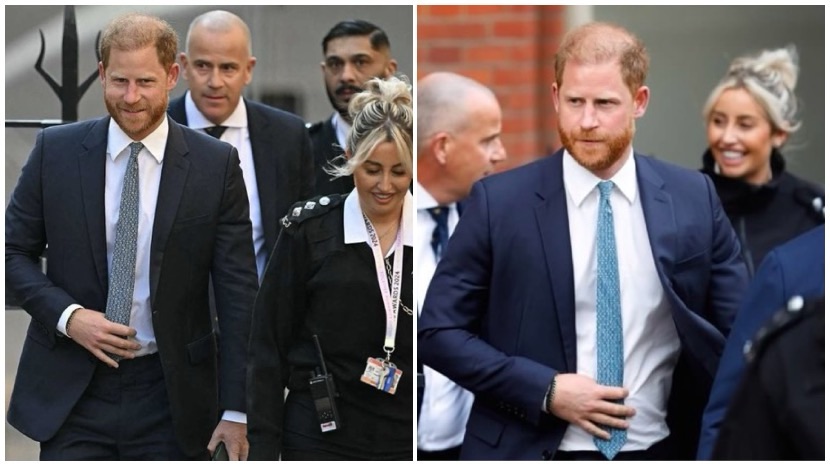NFL
BREAKING: Prince Harry Loses Lengthy Legal Battle to Restore Automatic Taxpayer-Funded Security for U.K. Visits, Court of Appeal Rules

Prince Harry Loses Legal Battle to Reinstate Taxpayer-Funded Security for U.K. Visits
London, May 2, 2025 — Prince Harry, the Duke of Sussex, has lost a multiyear legal challenge to reinstate automatic taxpayer-funded security for his family during visits to the United Kingdom, a ruling that marks a significant setback for the royal who stepped back from his senior role in 2020. The decision, handed down by a judge at the Court of Appeal on Friday, upholds the U.K. government’s 2020 determination that Harry’s security would no longer be guaranteed at the level previously afforded to working royals.

The legal battle began after Harry and his wife, Meghan Markle, the Duchess of Sussex, announced their decision to step away from their roles as senior members of the British royal family and relocate to California. Following their departure, the Executive Committee for the Protection of Royalty and Public Figures (Ravec), which oversees security arrangements for royals and dignitaries, downgraded the couple’s security status. Instead of the automatic protection they once received, Ravec ruled that security for the Sussexes would be assessed on a case-by-case basis during their U.K. visits. The committee also rejected Harry’s proposal to personally fund police protection, citing that such an arrangement would violate established policy.
A High-Stakes Appeal
Harry’s legal team launched an appeal earlier this year, arguing that the decision to downgrade his security was unfair and failed to follow proper procedures. In April 2025, the Duke attended a two-day hearing at London’s Court of Appeal, where his barrister, Shaheed Fatima KC, made a compelling case for reinstatement. Fatima highlighted that Ravec had not conducted a formal risk assessment before stripping Harry of his automatic security—a step she argued was a violation of the committee’s own standard protocols.
The appeal also brought to light serious security concerns, including a reported threat from al-Qaeda. According to court documents, the terrorist organization had called for Harry’s assassination, with a message stating that his death would “please the Muslim community.” Fatima told the court that the security arrangements currently in place for Harry were “inadequate, inappropriate, and ineffective,” emphasizing that the prince’s “life is at stake.” She added that Harry was not seeking automatic reinstatement of his previous security level but rather a fair process that properly assessed the risks he faces.
Despite these arguments, the Home Office, which legally represents Ravec, defended the committee’s decision. Sir James Eadie KC, representing the Home Office, argued that the “bespoke process” applied to Harry’s case was better suited to his unique circumstances as a non-working royal living abroad. Eadie also clarified that Harry’s security had not been entirely revoked but adjusted to reflect his changed status. The previous judge’s ruling, Eadie contended, was lawful and based on Ravec’s expert judgment.
A Final Ruling with Lasting Implications
On May 2, 2025, the Court of Appeal upheld the earlier decision, effectively ending Harry’s legal fight to restore his automatic security detail. The judge’s ruling reaffirmed the government’s position that Ravec acted within its rights to downgrade the prince’s security status after he stepped back from his royal duties. The decision means that Harry, Meghan, and their two children, Archie and Lilibet, will continue to rely on a privately funded security team for any future visits to the U.K.
Harry, who is fifth in line to the British throne, has previously expressed deep concerns about his family’s safety in the U.K. In public statements, he has said that the heightened security risks make him reluctant to bring his family to his home country—a sentiment that has kept the Sussexes largely absent from the U.K. since their move to California. The family has not traveled together to Britain since 2022, when they attended the Platinum Jubilee celebrations for Harry’s late grandmother, Queen Elizabeth II.
A Royal Divide and a Private Life
The ruling underscores the broader challenges Harry and Meghan have faced since stepping away from their royal roles. Now settled in Montecito, California, the couple has focused on building a new life, launching initiatives like their Archewell Foundation and producing content through partnerships with platforms like Netflix and Spotify. However, their relationship with the royal family remains strained, and Harry’s legal battles over security have only deepened the divide.
During last month’s hearings, Harry traveled alone to the U.K., without Meghan or any members of the royal family by his side. His presence in court, sitting quietly with a notepad and pen, highlighted the personal stakes of the case. Fatima’s closing remarks were particularly poignant: “There is a person sitting behind me whose safety, whose security, and whose life is at stake,” she told the judge, pointing to the real-world implications of the court’s decision.
Looking Ahead
For now, Prince Harry must navigate his family’s visits to the U.K. with the burden of arranging and funding private security—a costly and complex endeavor. The ruling may also set a precedent for how security is handled for other non-working royals, raising questions about the balance between public funding and personal safety for members of the royal family who step away from official duties.
As the Sussexes continue their life in the U.S., the outcome of this case is a stark reminder of the challenges they face in maintaining ties to the U.K. For Harry, the loss of this legal battle is not just a matter of security—it’s a barrier to returning to the country he once called home, further complicating his relationship with his family and his homeland.












